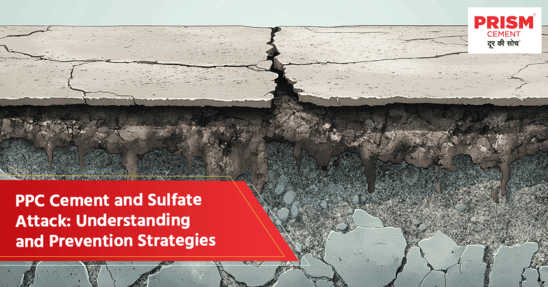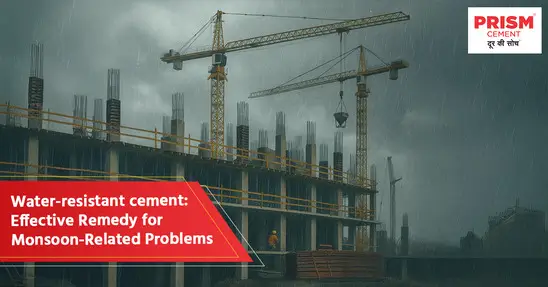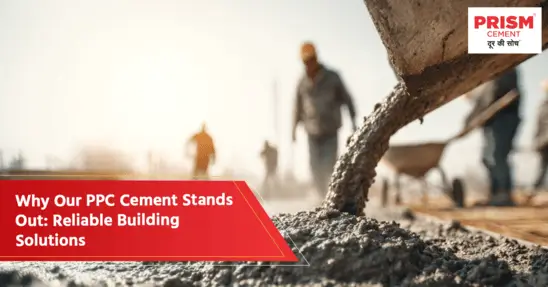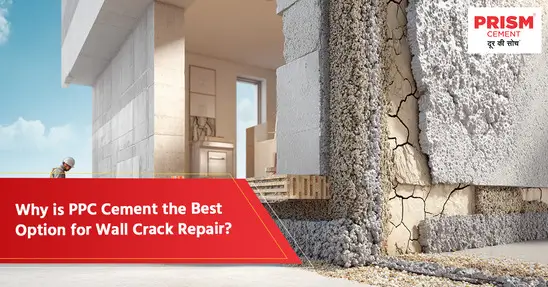Sulfate attack is one of the major concerns in the construction industry, as it may lead to severe damage to concrete structures. Portland Pozzolana Cement (PPC) offers a valuable solution to mitigate this issue.
Understanding Sulfate Attack
Sulfate attack occurs when sulfate ions present in groundwater, soil or other environmental sources penetrate concrete and react with the calcium hydroxide within the cement paste. This reaction forms expansive salts that can cause cracking, spalling and deterioration of the concrete.
Causes of Sulfate Attack
- Sulfate-Rich Environment: Areas with high sulfate concentrations in groundwater or soil are particularly susceptible to a sulfate attack.
- Poor-Quality Concrete: Concrete made with sub-standard aggregates or inadequate cement, or improper mixing techniques can be more vulnerable to a sulfate attack.
- Cracks and Defects: Even small cracks can facilitate the ingress of sulfate ions, leading to expansive reactions within the concrete.
Consequences of Sulfate Attack
- Structural Damage: Sulfate attack can weaken the structural integrity of concrete structures, leading to safety hazards.
- Aesthetics: The unsightly appearance of cracked and spalling concrete can diminish the value and appeal of a building.
- Maintenance Costs: Repairing and replacing damaged concrete due to sulfate attack can be expensive and time-consuming.
The Role of PPC Cement in Preventing Sulfate Attack
PPC cement, a blend of ordinary Portland cement and pozzolana, offers several advantages in mitigating sulfate attack:
- Enhanced Sulfate Resistance: The pozzolanic materials used in PPC help to reduce the formation of expansive compounds when sulfates are present.
- Improved Durability: PPC cement provides a denser and more durable concrete matrix, reducing the risk of sulfate penetration.
- Lower Calcium Hydroxide Content: PPC cement has a lower calcium hydroxide content compared to ordinary Portland cement, making it less susceptible to sulfate attack.
Prevention Strategies
- Use PPC Cement: Incorporating PPC cement into your construction projects is a proactive measure to prevent sulfate attack.
- Proper Concrete Design: Ensure that the concrete mix design is appropriate for the specific sulfate exposure conditions.
- Effective Curing: Proper curing is essential to develop the full strength and durability of the concrete, reducing its vulnerability to sulfate attack.
- Protective Coatings: Applying protective coatings to the concrete surface can act as a barrier against sulfate penetration.
- Regular Inspection and Maintenance: Conduct regular inspections of concrete structures to identify signs of sulfate attack and address any issue promptly.
Prism Cement: Your Partner in Sulfate Attack Prevention
Prism Cement offers a range of high-quality PPC cement products designed to provide excellent resistance to sulfate attack, such as Prism Champion All Weather Cement. Our commitment to quality and innovation ensures that our products deliver exceptional performance and durability.
By understanding the causes, consequences and prevention strategies related to sulfate attack, you can take proactive steps to protect your concrete structures. Choosing PPC cement is a wise investment in the long-term durability and sustainability of your building projects.




